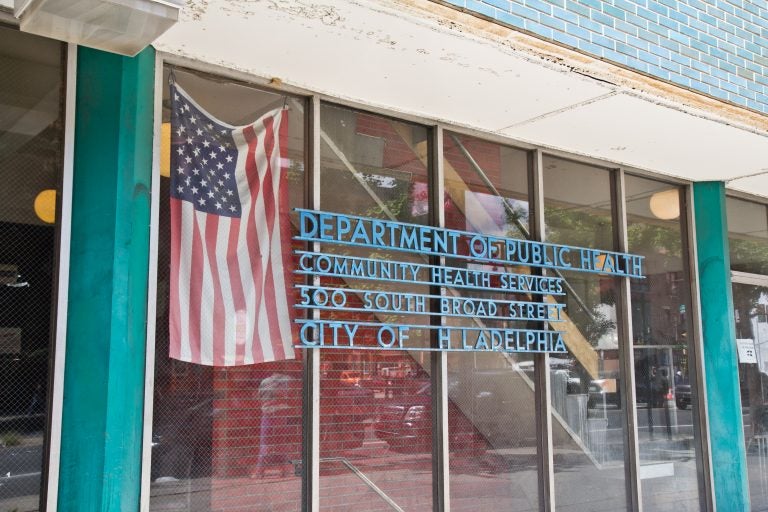Syphilis rates rise among Philadelphia women and people who inject drugs
The increase in women with syphilis is especially alarming to city officials because the disease is the most serious when it is passed on to a fetus.

Philadelphia’s Health Center #1 at Broad and Lombard streets. (Kimberly Paynter/WHYY)
Syphilis is on the rise in Philadelphia, as it is across the nation. Recently, however, city officials are seeing a greater proportion of the affected population are comprised of women and heterosexual men.
Rates of syphilis infection have been increasing steadily here for the past 10 years, but the disease had mostly affected men who have sex with men.
Within those two new populations, many report injection drug use, pointing to that as a high-risk factor in contracting the sexually transmitted disease.
The latest trend is consistent across the country. Nationally, between 2013 and 2017, overall primary and secondary syphilis rates increased by 73% — and by 156% among women.
Researchers at the Centers for Disease Control and Prevention issued a report earlier this year that found certain drug use to be a possible driver for the increase: Among heterosexual men and women with syphilis, the number of people who inject drugs and use methamphetamine more than doubled between 2013 and 2017. While syphilis rates also increased among men who have sex with men, the rate of those with syphilis who inject drugs/use meth did not.
Syphilis is curable with antibiotics, but it is often very hard to detect without screening. Untreated, it can lead to serious and long-term health consequences: blindness, tumors, and damage to the nervous system, heart and brain. But because those symptoms may not appear for years after a person is initially infected, it is common for people to have syphilis without knowing it, therefore spreading it easily.
The increase in women with syphilis is especially alarming to Philadelphia officials because the disease is most serious when it is passed on to a fetus.
“As more women are affected, we are going to see more infants affected, and that’s really devastating,” said Deputy Health Commissioner Caroline Johnson.
In the 1990s, Philadelphia saw a number of children born with congenital syphilis in the aftermath of the crack epidemic, which was also associated with an uptick in syphilis. In 1998, 21 cases of congenital syphilis were reported from Philadelphia County, for a rate of 92.1 cases per 100,000 births, more than four times the national rate. By the early 2000s, instances of congenital syphilis were virtually wiped out, and although the numbers are still in the single digits, they have begun to creep back up.
Congenital syphilis can induce spontaneous miscarriages, cause birth defects or fetal anomalies, and have long-term developmental effects on a child.
Johnson said the city has been monitoring the increased rates of syphilis and its intersection with injection drug use in Philadelphia. (Locally, she said, the city did not see the same correlation with methamphetamine use that the CDC report found).
“About five or six years ago, we had no women [with syphilis] who were reporting injection drug use — and now it’s up to approximately 10 percent of our cases,” said Johnson, who cautioned that the overall number of cases is still very small among women.
To explain the rising proportion of women and heterosexual men with syphilis who use drugs, CDC researchers say drug use can lead to riskier behavior, including unprotected sex. Philadelphia’s Johnson points to sex work related to drug sales as a possible risk factor among women.
To help prevent the disease from spreading, medical professionals have for decades practiced what local public-health officials call “partner services.” When someone tests positive for syphilis at one of the city’s health centers, medical professionals there ask for the names and contact information for all the sexual partners the person may have exposed to the infection. Health professionals then call those people to recommend they be treated, without revealing the identity of the individual who referred them. With the rapid increase in rate, city officials are accelerating those efforts.
The city has also ramped up its screening efforts at health centers, and at shelters in the Kensington area and clinics where women engaged in sex work visit — places where people who inject drugs can more easily find the services.
WHYY is your source for fact-based, in-depth journalism and information. As a nonprofit organization, we rely on financial support from readers like you. Please give today.





